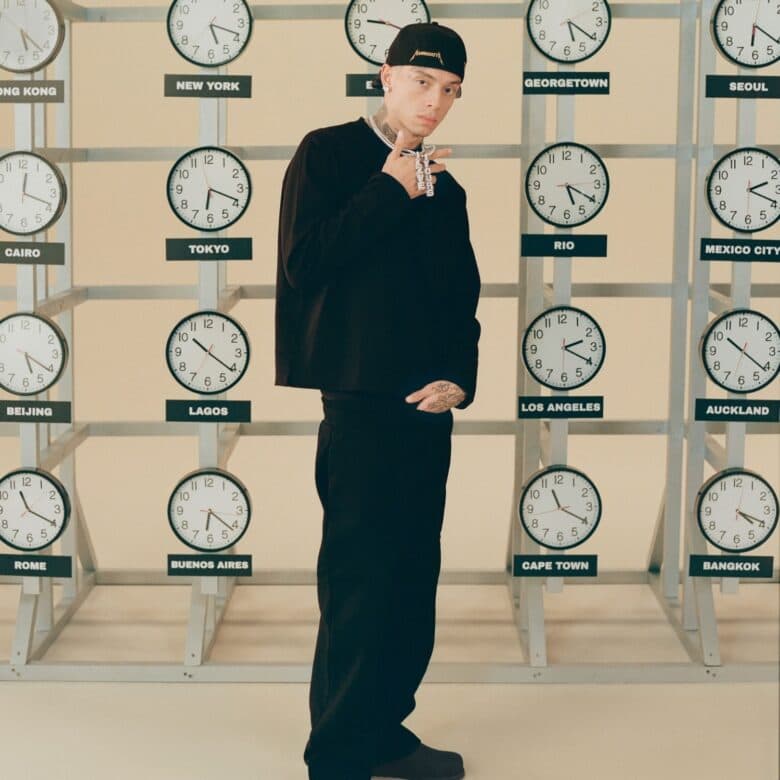Five minutes with oSHAMO — The artist is fusing Lagos and London in his tracks

Having grown up in Lagos’ Agege neighbourhood before moving to London half a decade ago, oSHAMO’s spent his burgeoning career switching up the afrobeats scene. Incorporating the rhythms of fuji and the soulful narratives of Islamic music, his debut EP, First of My Kind, pays homage to the artist’s Nigerian heritage, while exploring what it’s like to navigate the UK’s music scene as someone who only moved here fairly recently. The result? A melange of sound from a young artist who’s unafraid to push boundaries and simultaneously stay grounded in his roots. oSHAMO sits down with HUNGER to discuss the journey behind his debut EP, his Nigerian roots and how he’s bridging the gap between cultures.
Your debut EP is called First of My Kind. What does this title signify for you?
This EP is a powerful reflection of my life experiences and the vibrant places that have shaped me. Moving to the UK was a pivotal step away from Nigeria, and it opened my eyes to the incredible sounds of my homeland. Initially, I felt a bit shy and questioned whether my unique style would resonate here. However, the overwhelming love for tracks like ‘Life of the Party’ inspired me to fully embrace my role as a cultural bridge between Nigeria and the world, starting with the UK. With trailblazers like Burna Boy leading the charge, I proudly declare myself ‘the first of my kind.’ I invite you all to embark on a journey with me into our rich African roots through this EP!
Did growing up in Agege, Lagos shape your musical identity?
Absolutely! Each morning I awaken to the rich, vibrant sounds of fuji and Islamic music filling the air, creating an atmosphere that inspires my creativity and sets the tone for my day. This melodic backdrop has not only enhanced my artistic expression but also instilled a profound sense of purpose in my work. As I sing each note, I feel deeply connected to the voices of the legendary pioneers who came before me like fela, Burna Boy and Asake to mention a few, whose innovative contributions have paved the way for artists like myself. Their spirit resonates in my music, fueling my passion and guiding my journey as I strive to honor their legacy through my own unique artistry.
Your sound merges fuji, hip-hop and amapiano. How do you approach blending these genres while staying true to your Nigerian roots?
If I were to explain my sound, I would say there is a key element of ‘afro’ which is the bedrock of my sound. So, no matter how I infuse other sounds and genres with that foundation, there will always be a stem of originality and staying true to that bedrock in every oSHAMO song you listen to.

The focus track, ‘I Do’, delves into love. Can you tell us more about the story behind this song?
On 9 December 2023, weeks before I made ‘Life of the Party’, I was listening to love songs by some of the legendary acts in the afrobeats scene and I got the idea of making a love song on an amapiano and afrobeats fusion beat. THASOUNDZ came through with a very catchy beat that had a hook on it saying “I do” and I literally wrote my lyrics in the next hour. I traveled down to east London to meet my vocal engineer where we finished up the song. All on the same day.
‘Alaska’ stands up for Nigerian migrants and challenges damaging stereotypes. Why was it important for you to tackle this topic, and what impact do you hope the song will have?
‘Alaska’ stands as a heartfelt reminder of the challenges faced by myself and my fellow Nigerians. This track gently addresses the misconceptions surrounding migration, emphasising that, for many, it’s not merely about escaping difficult circumstances, but about showing resilience and strength. My message with ‘Alaska’ is one of hope. Despite the hardships along the way, I encourage everyone to keep moving forward. One day, you’ll reflect on your journey and realise just how far you’ve truly come.
You incorporate Yoruba, English and Arabic into your music. How do you balance showcasing your cultural heritage with making music accessible to a global audience?
Being at the start of my career, it is only right for everyone to know oSHAMO’s story, sound, identity and motivation. And I believe that every element you find in an oSHAMO song from the words to the language and even the instrumentation aids the introduction to oSHAMO.
Your journey began with viral freestyles and songwriting on TikTok. How has social media shaped your career, and what advice would you give to emerging artists looking to make their mark online?
The connection I share with my audience feels surreal. I believe that everyone who supports my craft or enjoys my personality on social media must relate to my life in some kind of way. If they do relate, it means they have experienced – or are currently experiencing – the themes that my songs and content explore. That connection is more than enough motivation to keep me focused.
In tracks like ‘Notorious’ and ‘Won Femo’, you reflect on personal growth and ambition. How have these themes played a role in shaping your artistry and perspective?
‘Won Femo’ is a backstory for people that really want to know who oSHAMO is, where my drive comes from, what my purpose is and my major influence whilst growing up. It’s also a song for people wanting to know how and why oSHAMO keeps pushing hard against all odds. ‘Notorious’ on the other hand, is a song full of affirmations and things I really want my music to achieve for me.
As a UK-based afrobeats artist, how do you see your role in bridging the gap between afrobeats’ Nigerian roots and its global appeal?
Bridging the gap is essentially what I want to be known for as I’m a big fan of bringing different worlds together in one room. To be honest, the reason why my EP is a mix of fuji, hip-hop and amapiano is because, growing up in an Islamic environment, where the core element of fuji originates, I decided that whatever genre I sing, I need to let people know more about my identity and cultural background. Also in times like these, where I feel like the world is so divided, the only thing that can bring everyone together is music, hence my sound – which merges different elements into one – is to show the world how truly connected we are.
So, what’s next for oSHAMO?
There’s lots of exciting features currently in the works right now! What I’ll say is listen to the EP for now, and 2025 will be a great year.
- WriterScarlett Coughlan
- Banner Image CreditSCARYTOWN




